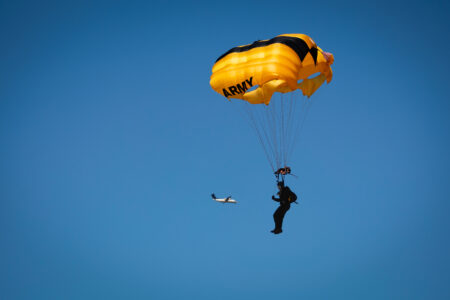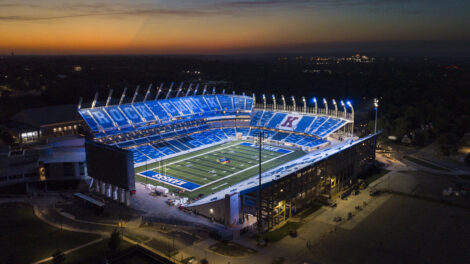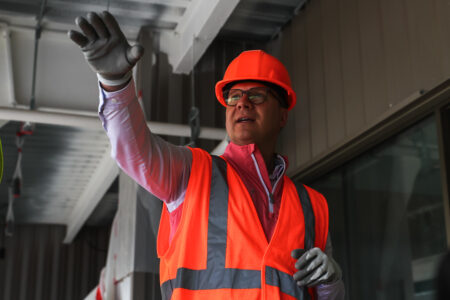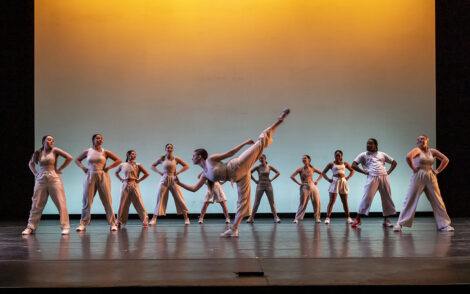KU Athletics expected to pay Deloitte $200,000 for consultation on current issues, revenue generation, valuation, more

photo by: Missy Minear/Kansas Athletics
KU athletic director Travis Goff speaks during the beam ceremony at David Booth Kansas Memorial Stadium in Lawrence on Thursday, Sept. 19, 2024.
The University of Kansas athletic department is expected to pay consulting firm Deloitte $200,000 for approximately five months of work as part of what KU has called a “first-of-its-kind collaboration.”
In return, Deloitte will provide recommendations across a variety of topics in college sports, including those related to the pressing issues of “revenue-sharing, roster caps, walk-ons, sport offerings, NIL implications” and more, according to a document obtained by the Journal-World via an open-records request.
KU Athletics previously announced the partnership on Sept. 12, with athletic director Travis Goff stating in a press release, “Effective leadership requires humility and a willingness to bring in outside perspective and vantage points. That approach has served us well to date and it is even more imperative at this time to work with a strategic firm like Deloitte.”
The deal between KU and Deloitte was signed on Aug. 16 by Goff and a Deloitte principal whose name is redacted. Five Deloitte employees will work on the project for a total of 1,150 hours, and the $200,000 total does not include possible travel expenses.
Their work will consist of recommendations to be delivered to KU in four broad areas: “scenario planning” (with regard to those revenue-sharing and name, image and likeness issues), partnerships with third-party vendors, revenue generation and valuation of the athletic department.
The prospect of evaluating KU’s sport offerings was not included among the “sampling of opportunities that Deloitte will focus on” in KU’s initial press release, but is mentioned in the contract. The athletic department currently fields 18 varsity sports teams, including seven men’s teams and 11 women’s teams (numbers that count indoor and outdoor track and field as separate sports).
Many of the developments cited in the “scenario planning” segment pertain to the pending settlement in the House v. NCAA antitrust case, which if approved would allow schools to furnish a pool of up to approximately $20 million with which to directly pay their athletes — in turn redefining the role of name, image and likeness collectives like the KU-affiliated Mass St. Collective, which have functioned as external entities that pay players.
The proposed settlement is also expected to redefine scholarship limits for individual sports, instead allowing a school to provide as many scholarships as it likes up to a given roster cap. For example, football teams can currently contain 85 scholarship athletes and a host of non-scholarship players, but under the House settlement they would be able to field up to 105 players with 105 scholarships — which has cast doubt on the future of non-scholarship, or walk-on, athletes.
In the process of assessing these issues, Deloitte will create a “‘business as usual’ scenario” for KU Athletics and “3-5 alternatives for potential outcomes,” as well as host a planning workshop with KU Athletics leaders featuring comparisons to peer institutions. One goal is to create a roadmap to help the athletic department proceed going forward.
Owing in part to uncertainty surrounding some of these issues, incidentally, the athletic department has not yet adopted an operating budget for the ongoing fiscal year 2025. It was originally supposed to hold a meeting to do so in September, but on Sept. 19, Goff said that a budget was still “a number of weeks away” but added that the department was running smoothly in its absence.
Other key points from the contract:
• Deloitte will review the current third-party vendors KU works with, hoping to identify possible instances of “service overlap, duplication and/or opportunities to increase value while optimizing cost.”
• Deloitte will chart the sources from which KU Athletics gets its funding, and where that funding goes. And the peer comparisons KU plans to use for scenario planning may also come in handy for revenue generation, as Deloitte will compare the KU Athletics “funding model” to those of its peers. The consultants will also devise a slate of potential opportunities for revenue generation and cost containment.
• Deloitte will create a report that determines the financial value of KU Athletics to KU as an institution, to Lawrence and to the Kansas City metropolitan area. It will also include an assessment of the value of the athletic department’s brand, and the value of its membership in the Big 12 Conference.
This kind of economic impact survey can serve as a means of measuring a university’s return on investment. During the fiscal year 2023, the university subsidized KU Athletics with $1.7 million in direct institutional support. According to a Sportico database, that ranked among the lowest such subsidies in the country among Division I schools.
Since the approximate five-month timeline of Deloitte and KU’s partnership begins as of Sept. 1, Deloitte will likely have submitted all its deliverables by February. When KU receives a given deliverable, it has 10 days to either accept it or note “deficiencies” that Deloitte will then correct.







